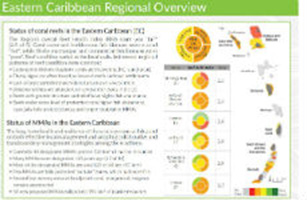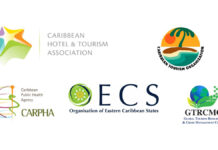Six Eastern Caribbean countries launch region’s first coral reef report cards
June 10th 2016-As activities regarding on World Ocean’s Day (June 8th 2016) continue, six Eastern Caribbean countries have marked their commitment to preserving the region’s extraordinary marine ecosystems by launching the first Eastern Caribbean coral reef report cards.
The six countries include Antigua and Barbuda, Dominica, Grenada, Saint Lucia, St. Kitts and Nevis and St. Vincent and the Grenadines. Each report card was created in collaboration with local government partners, including fisheries, forestry, marine resource and environmental departments, and non-governmental organizations.
Coral reefs are home to over 25 percent of all marine species, protect the shore from storms, and create tourism opportunities. Despite their economic and environmental importance, it is difficult to understand their health and status without searching through complex data or becoming a regular diver.
The Nature Conservancy combined existing data, collected by regional and international scientists, to create individual report cards for six countries. The report cards not only provide information on reefs, but also assess mangrove and seagrass habitats, as well as management strategies to improve these ecosystems. They are a concise, visual and easy-to- understand tool designed to be accessible for audiences from students up to the policy level.
All of the data and report card scores are also available at www.caribnode.org, an online mapping tool where users can surf through data and create maps based on their interests. This allows researchers and scientists to access and share data across the region.
Agnes Esprit, In-Country Project Coordinator in Dominica, where the launch of the report cards coincides with the opening ceremony for the Cabrits National Park Marine Reserve office says: “Having reliable data that is accessible allows community and resource officers to take actions that preserve our reefs and marine resources.”
The report cards were funded by the German Federal Ministry for the Environment, Nature Conservation, Building and Nuclear Safety as part of the Climate- Resilient Eastern Caribbean Marine Managed Areas Network (ECMMAN) project, which aims to build a regional network of marine managed areas.
Data indicates that many reefs within protected areas recorded more complex coral structures with higher numbers and varieties of fish species, which can help rejuvenate national fisheries resources.
Patricia Kramer, a coral reef ecologist, who led the data synthesis and development of the ECMMAN Report Cards says:”Report cards are an effective communication tool to consistently track reef health; show the ability of fully protected areas to support more fish; and raise awareness on the importance of protecting coral reefs. ”
The report cards are modeled after the Healthy Reef Initiative’s report cards from the Mesoamerican region, which have been used as a tool to advocate for marine conservation for almost a decade.






